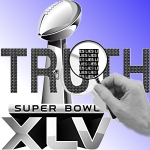The National Football League’s championship game, the Super Bowl, has long been a cultural force to be reckoned with. America’s near-half-century love affair with the big game makes the Sunday on which it appears a holiday on par with Thanksgiving, Christmas and New Year’s Eve. All well and good, until people start generating all sorts of weird non-sports data from Super Sunday. For example…
 People are already pointing to the upward trajectory of resold ticket prices to this year’s game as a sign that the US economy is on the upswing. Economists are also using the Super Bowl’s 30-second TV commercial sales as an economic barometer. This year, the price of an ad has rebounded back up around the $3m mark and, unlike in 2010, all the spots were sold months ago (but sadly, this one didn’t make it)… So forget those drab, unchanging unemployment rates, America! Things have never been better!
People are already pointing to the upward trajectory of resold ticket prices to this year’s game as a sign that the US economy is on the upswing. Economists are also using the Super Bowl’s 30-second TV commercial sales as an economic barometer. This year, the price of an ad has rebounded back up around the $3m mark and, unlike in 2010, all the spots were sold months ago (but sadly, this one didn’t make it)… So forget those drab, unchanging unemployment rates, America! Things have never been better!
Things will be even better if the Packers win. A Canadian economist has studied past Super Bowl results and determined that the US economy grows an average of 3.1% following an NFC team hosting the Lombardi Trophy, vs. a 2.6% average spike following an AFC victory. Finally, conclusive proof that Ben Roethlisberger is bad for America.
There’s more than just an economic future riding on the game. A California heart institute did a study of two Super Bowl games involving Los Angeles teams and found that cardiac death rates in LA County were up 16% for men, 30% for women and a whopping 90% for seniors following the LA Rams loss in 1980. Conversely, the LA Raiders victory in 1984 led to a decrease in cardiac deaths (-2% men, -12% women, -49% seniors). “Just live, baby!”
Of course, no collection of Super Bowl stats would be complete without the now thoroughly debunked meme that domestic abuse rises 40% on Super Bowl Sunday. Although this ‘fact’ was plastered across the front pages of every major newspaper in 1993, it was never based on anything more than anecdotal evidence supplied by a (presumably well-meaning) battered women’s hotline. Subsequent (and real) research by Oths & Robertson in 2007 found the abuse claims to be unsubstantiated. The man who was the first to call bullshit on the Super Bowl ‘Day of Dread’ abuse meme, the Washington Post’s Ken Ringle, noted “the twin phenomena of media convergence and media orchestration, in which causists show up wherever the most TV lenses are focused, hoping to piggyback their message out to a global audience of millions.”
This last point is echoed by a former bookie who now writes for the Independent Florida Alligator. Bill O’Connor says that cops love the Super Bowl, because it allows them to look like Elliot Freaking Ness. Cops know back-of-the-bar credit bookies can take more action on the Super Bowl than they do in most months of action, so they wait until game day, then burst down the door, total up the seized betting slips and multiply that number by 365. This allows them to brag to the media that they took down a $12m illegal gambling operation, when all they actually got was a guy suffering from writer’s cramp.
But hey, it ain’t all bad news. Another Florida resident, Thomas Joiner, says the Super Bowl gives people reasons to go on living. The professor of psychology at FSU conducted a study which showed that as Super Bowl viewership increased, the suicide rate dropped. Joiner concluded that the game provided a ‘social connection’ that sufficiently boosted people’s spirits back up to the point where life once again seemed worth sticking around for. So this Sunday, pass the pretzels and save a life!





